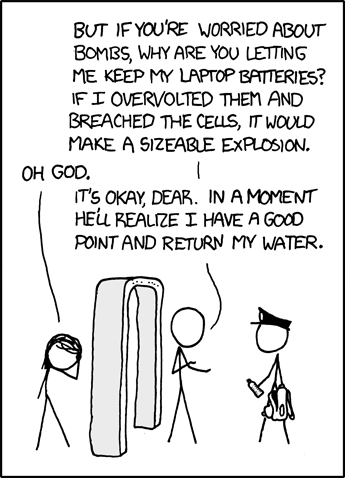In January (this year) a man on a Qantas flight was asked to remove his t-shirt because it bore the text:
“Hello. My name is Inigo Montoya. You killed my father. Prepare to die.”
As I understand it these words somehow disturbed the flight attendants on the plane so much that the passenger should fly without the offending text. Naturally they could not just refer to their perception of his bad taste so they stated that his text unnerved the other passengers.
The whole thing gets even sillier as the text is a quote from the 1987 adventure comedy Princess Bride. The passenger did not have anything else to wear and the whole thing was dropped. He was allowed to continue on his way.
This is just a strange and stupid situation. It’s totally unbelievable. And yet it has happened before and people have been forced off planes. Or not allowed on planes because of silly texts on clothes.
In 2003, John Gilmore was wearing a pin with the words “suspected terrorist” and was asked to remove the pin. Gilmore, a rights activist and a founder of the Electronic Frontier Foundation, refused to remove the pin and was not allowed to continue on his flight. British Airways refused to fly him because they didn’t like his accessories. The pin was part of a campaign to protest the way in which innocent people were being profiled as terrorists.
In 2006, airport security at JFK forced Raed Jarrar to change his t-shirt because it contained the words “We will not be silent” in English and Arabic. Security said it was like “going to a bank with a T-Shirt reading ‘I am a robber.'” – Even their reasoning is faulty.
Texts on t-shirts are not the cause of concern. If fellow passengers are concerned then maybe the crew explain that their paranoia is silly and give them the option to leave. But it is much better to silence the person wearing the text. Its all very sad, and has nothing to do with security, safety or even perceptions of safety.
The problem is that stupid people have power. We cannot argue with these people because they are full of their own power and reason doesn’t work. Arguing would only aggravate the situations.
